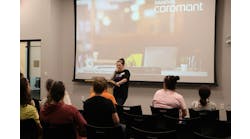Nina Bischoff is industrial sales engineer at Phoenix Contact USA.
In her relatively famous study, published in the Harvard Business Review, MIT’s Susan Silbey and her colleagues found that women in engineering experienced a significant amount of gender bias not only at the college level, but even more so in internships and co-ops and then when entering the workforce. She estimates that 40% of women who earn an engineering degree either quit or never enter the profession. What can be done to nurture and develop these women, especially early in their careers?
Nina Bischoff, industrial sales engineer, Phoenix Contact USA: In my experience, gender bias was seen in all levels of my schooling and professional life. I have thought long and hard about what might make the fallout from this better, and the answer is clear—mentorship. I consider it my mission now to encourage young female engineers in their careers and to always leave my door open to them. Showing them an example of a woman who is on their side makes all of the difference.
Also read: Mentors can guide women over engineering-career hurdles
industrial sales engineer at Phoenix Contact USA
One of the other findings in Silbey’s report is that the women who participated were hoping to make a more socially conscious impact in their engineering pursuits than the males in the study. What, if anything, does this tell us about gender bias? And, if the report is indicative of a real female desire to make a difference, where might women find those types of jobs to have a positive impact on society and civilization with their engineering and automation expertise?
Nina Bischoff, industrial sales engineer, Phoenix Contact USA: While female and male engineers may have been shown to have different motivating factors, this should not be looked at as ineptitude in either direction. Rather, it is an opportunity to succeed because having a diverse group of people involved in a project will bring about many different viewpoints and ideas. These different viewpoints, skills and motivating factors will encourage teams to tackle projects in ways a singular person may not have come up with on their own.
According to the latest research from the Society for Women Engineers, females earn 10% less than their male counterparts. How does this impact a woman’s interest in entering an automation-related field, and what can be done to counteract this?
Nina Bischoff, industrial sales engineer, Phoenix Contact USA: Knowing that male counterparts could potentially earn more can be off-putting for future female engineers. We, as a society, can combat this by encouraging salary transparency, encouraging women to negotiate their salaries and training hiring departments to compensate fairly.
How can mentoring programs help women to stay the course and feel fulfilled in their automation or engineering pursuits?
Nina Bischoff, industrial sales engineer, Phoenix Contact USA: Mentorship programs are key to helping women feel fulfilled and welcome in their careers. Having another woman to show you the ropes of a new company helps you to feel less alone. It also helps give the feeling of safety and security that is often lacking.
What sorts of initiatives is your company involved with to encourage female participation in the automation field?
Nina Bischoff, industrial sales engineer, Phoenix Contact USA: I am so lucky to work for a company that values its employees and future employees. Phoenix Contact USA is active in the community and hosts STEM-related events for the next generation. They also help with female engineer retention by having mentor and apprenticeship programs.






